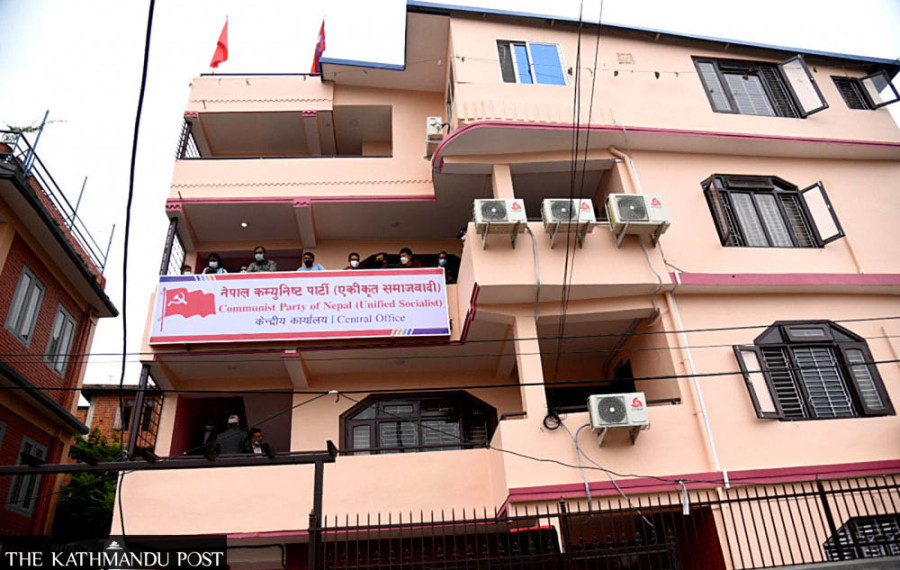Politics
What led to Unified Socialist’s debacle?
Observers had warned that for the outfit, earning national party status through polls was easier said than done.
Nishan Khatiwada
On July 23, 2022, Madhav Kumar Nepal, while speaking at a function in Kathmandu, claimed that the CPN (Unified Socialist) would secure 20-25 lower house seats under the proportional representation category.
“Despite fielding only 28 percent candidates in the last local polls, we garnered 927,ooo votes. Had we contested in every part of the nation, we would have received 2 to 2.5 million votes. So, no one can bar us from garnering 20-25 seats under the proportional representation category. It also signifies that our party is not weak,” Nepal said at the time.
The party’s performance in May’s local polls was, however, dismal—it won only 20 units.
Unified Socialist leaders had, in the lead up to the polls, repeatedly boasted their rich cadre base. Putting up a brave face, they claimed they would win the race for the national party status in the November polls.
In an interview before the major polls, senior leader Jhalanath Khanal had said the party would secure victories in most of the 19 federal and 35-40 provincial constituencies it was contesting.
But after it garnered only a little over three percent votes in May’s local polls, political watchers had forewarned that earning a national party status was easier said than done for the party.
The forewarning has proved right.
Unified Socialist managed to secure only 2.82% of the proportional representation votes in the recently-concluded elections. The party failed to make it to parliament as a national party, despite winning 10 seats under the first-past-the-post (FPTP) system.
The party had fielded 19 candidates for the House of Representatives (HoR) elections with the backing of the Congress-led alliance.
Leaders’ claims did not work. The party stood a distant seventh in the polls. In contrast, the newly-formed Rastriya Swatantra Party and right wing Rastriya Prajatantra Party fared much better winning 20 and 14 seats, respectively, with both getting a national party status.
To the surprise of many, even the Janamat Party—with a narrow voter base in Madhesh province—got the national party status.
So what led to the lacklustre performance of the Unified Socialist in the major polls?
CK Lal, a political commentator and columnist for the Post, said the voters cast their vote to a party, either based on their traditional involvement or because of the anti-incumbency sentiment. “But the Unified Socialist turned out to be unfit for both slots,” he said.
Its history of formation should not be overlooked; the traditional voters of the CPN-UML did not vote for a splintered force, say observers.
Unified Socialist was officially registered at the Election Commission on August 25, 2021. The dissident faction in the CPN-UML split from the party to form a new one under the leadership of Madhav Kumar Nepal, after KP Sharma Oli dissolved the House, twice.
“The party lacks a considerable number of traditional voters as it is a splinter force. Being a part of the ruling coalition, the anti-incumbency sentiment also could not come in handy,” Lal told the Post.
A socio-political analyst Chandra Dev Bhatta concurs. “Their split from the CPN-UML disenchanted the traditional voters who had expected a crucial role being played by Madhav Kumar Nepal to keep the communist party intact,” he said. “But he opted for a split and lost the trust of a large chunk of the voters.”
According to Bhatta, the Unified Socialist leaders’ high claims were merely strategic to keep the leftover party cadres intact.
Lack of strong organisations backfired for the party in November polls and will continue to do so if blatantly ignored, say political watchers. “The party could not garner organisation-based votes because the party itself was in its infancy,” said Lal, the political commentator.
Bhatta added that the party’s current voter base would also diminish in the future if it continues to stonewall the idea of building and strengthening its organisations. “When it entered the election battleground, the fraternity organisations were incomplete,” he said.
Neither did the Unified Socialist have charismatic leaders nor did it have an ideological clarity in the pre-polls period, said both Lal and Bhatta.
Party leaders agree they could not strengthen their organisations as expected and a part of the fault was also seen during the campaigning.
Unified Socialist vice chair Pramesh Hamal said the newly formed party could not prepare strongly and organisationally. According to him, focusing on electioneering and channelising their energy mostly on the 19 constituencies is another important factor behind the party’s poor poll performance. “The failure to campaign equally in every nook and corner also led to such results, particularly under the proportional representation category,” Hamal told the Post.
Hamal added that the location of their election symbol in the latter part of the ballot paper was another reason behind the debacle. “We also suspect that under the EC’s plan, the vote counting might have been influenced to prevent us from being a national party.”
So what’s next? The observers said the party should acknowledge the result as its actual strength.
Political commentator Lal said the party has no options other than to acknowledge the strength of its voter base as evident from the results of the proportional representation voting. “Either it should merge with others or play the power politics single-handedly, or use another strategy on the calculation of PR votes (as the PR votes reflect the actual strength in the event of electoral alliances).”




 13.12°C Kathmandu
13.12°C Kathmandu














